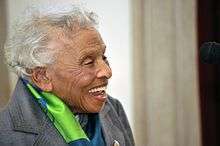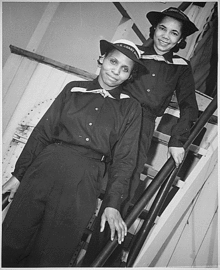Olivia Hooker
| Olivia Hooker | |
|---|---|
 Hooker addressing an audience at a Women's History Month celebration in Manhattan on 30 March 2011. | |
| Born |
Olivia J. Hooker February 12, 1915 Muskogee, Oklahoma |
| Education |
Ohio State University[1] Teachers College, Columbia University[2] University of Rochester[2] |
| Occupation | Professor, psychologist |
Olivia J. Hooker (born February 12, 1915) is the first African-American woman to have entered the U.S. Coast Guard, which she did in February 1945, and a retired psychologist and professor.[3][4] She became a SPAR (Semper Paratus Always Ready), a member of the United States Coast Guard Women's Reserve, during World War II.[5] She earned the Yeoman, Second Class rank during her service.[6] She served in the Coast Guard until her unit disbanded in mid-1946.[7] Later she went on to be a psychologist and a professor at Fordham University.[8]
Early life and education
Hooker was born in Muskogee, Oklahoma on February 12, 1915.[9] Ku Klux Klan members ransacked her home during the Tulsa Massacre of Black Wall Street of 1921 while she hid under a table with her three siblings.[3][10] Later Hooker was a founder of the Tulsa Race Riot Commission in hopes of demanding reparations for the riot's survivors.[6] In 2003, she was among survivors of the riot to file an unsuccessful federal lawsuit seeking reparations.[11]
After the riots, Hooker's family moved to Columbus, Ohio where she earned her Bachelor of Arts in 1937 from Ohio State University. While at OSU, she joined the Delta Sigma Theta sorority where she advocated for African-American women to be admitted to the navy.[12] She received her Masters ten years later in 1947 from the Teachers College of Columbia University. In 1961, she received her PhD in psychology from the University of Rochester.[13]

Career
U.S. Coast Guard
Hooker applied to the Women Accepted for Volunteer Emergency Service (WAVES) of the U.S. Navy, but was rejected due to her ethnicity.[13] She disputed the rejection due to a technicality and Hooker was accepted. However, she had already decided to join the Coast Guard.[14] She entered the U.S. Coast Guard in February 1945. On March 9, 1945, Hooker went to basic training for six weeks in Manhattan Beach, NY where Coast Guard Women's Reserve (SPARS) had to attend class and pass exams. She was one of only five African-American females to first enlist in the SPAR program. After basic training, Hooker specialized in the yeoman rate and remained at boot camp for an additional nine weeks before heading to Boston.[14] Here, she performed administrative duties and earned the rank of Yeoman Second Class in the Coast Guard Women's Reserve.[11] In June 1946, the SPAR program was disbanded and Hooker earned the rank of petty officer 2nd class and a Good Conduct Award.[14]
Psychology
After receiving her Masters, Hooker moved upstate to work in the mental hygiene department of a women's correctional facility in Albion. Many women in this facility were considered to have severe learning disabilities by staff. Hooker believed they were more capable than given credit and re-evaluated them and helped the women to pursue better education and jobs. She credited this success with "approaching them with an open mind."[12]
In 1963, she joined Fordham University as a senior clinical lecturer; eventually she served an associate professor until 1985.[15]
She was one of the founders of the American Psychological Association's (APA) Division 33, Intellectual and Developmental Disabilities. She served as an early director of the Kennedy Child Study Center in New York City.[16]
Later life
Hooker retired at age 87.[6] She joined the Coast Guard Auxiliary at age 95.[3] She is currently serving as a volunteer in the Coast Guard Auxiliary in Yonkers, NY.[17]
Awards
- American Psychological Association (APA) Presidential Citation (2011)[13]
- Good Conduct Medal Coast Guard[18]
- New York State Senate Veterans' Hall of Fame (2012)[1]
Legacy
On Monday, February 9, 2015, Congresswoman Kirsten Gillibrand spoke in Congress about Hooker to "pay tribute" to her.[18]
Also in 2015 the Olivia Hooker Dining Facility on the Staten Island coast guard facility was named in her honor.[19][3] A training facility at the Coast Guard's headquarters in Washington, D.C. was also named after her that same year.[20] On May 20, 2015, President Barack Obama recognized the Coast Guard service and legacy of Olivia Hooker while in attendance at the 134th Commencement of the United States Coast Guard Academy.[21]
References
- 1 2 Stewart-Cousins, Sen. Andrea (2012). "Dr. Olivia J. Hooker - New York State Senate". New York State Senate. Retrieved 18 March 2015.
- 1 2 Young, LT Stephanie (29 October 2013). "Olivia Hooker: A SPAR's Story". U.S. Coast Guard. Retrieved 17 March 2015.
- 1 2 3 4 "Dr. Olivia Hooker, 1st Black Woman in U.S. Coast Guard, Honored with Training Facility & Dining Hall Dedications". Good Black News. Retrieved 2015-03-19.
- ↑ http://www.uscg.mil/history/people/HookerOliviaBio.pdf
- ↑ Thiesen, William H. "SPAR Olivia Hooker: First African American Woman in the Coast Guard" (PDF). United States Coast Guard: U.S. Department of Homeland Security. Retrieved 17 March 2015.
- 1 2 3 "Coast Guard Names Training Facility After 1st Black Woman In Service". News One. Retrieved 2015-03-19.
- ↑ MacKay, Jenna (2017-10-19). "Profile: Olivia Hooker". Psychology's Feminist Voices. Archived from the original on 2017-10-19. Retrieved 2018-03-16.
- ↑ Gay, Mara (2015-02-28). "Olivia J. Hooker: Coast Guard Pioneer, Fordham Professor and Activist". Wall Street Journal. ISSN 0099-9660. Retrieved 2018-03-16.
- ↑ "Black History Month: Survivor Recalls 1921 Tulsa Race Riot". CBS News. 12 February 2015. Retrieved 17 March 2015.
- ↑ "Meet The Last Surviving Witness To The Tulsa Race Riot Of 1921". National Public Radio. May 31, 2018. Retrieved June 2, 2018.
- 1 2 Gay, Mara (February 27, 2015). "Olivia J. Hooker: Coast Guard Pioneer, Fordham Professor and Activist". Wall Street Journal. Retrieved 30 April 2015.
- 1 2 Miller, Anna (November 2012). "Living history: Pioneering psychologist and civil rights activist Olivia Hooker reflects on her legacy". American Psychological Association. Archived from the original on 2012-11-22. Retrieved 2015-04-30.
- 1 2 3 MacKay, Jenna (2013). Profile of Olivia Hooker. In A. Rutherford (Ed.), Psychology's Feminist Voices Multimedia Internet Archive. Retrieved from http://www.feministvoices.com/olivia-hooker/. Retrieved on 18 March 2015.
- 1 2 3 Young, LT Stephanie (October 29, 2013). "Olivia Hooker: A SPAR's Story". Retrieved 30 April 2015.
- ↑ Gay, Mara (2015-02-27). "Olivia J. Hooker: Coast Guard Pioneer, Fordham Professor and Activist". WSJ. Retrieved 2015-03-20.
- ↑ Cautin, Robin L (April 2012). "The indomitable Dr. Olivia Hooker". The General Psychologist. American Psychological Association. Retrieved 2015-04-30.
- ↑ "US Coast Guard Honors TC Alum and Centenarian Olivia Hooker". Teachers' College Media Center, Columbia University. April 9, 2015. Retrieved 2015-04-30.
- 1 2 "Congressional Record, Volume 161 Issue 21 (Monday, February 9, 2015)". Gpo.gov. 2015-02-09. Retrieved 2015-03-19.
- ↑ "Dr. Olivia Hooker Turns 100 | Juniper Hill Civic Association". Juniperhillny.com. 2015-02-07. Retrieved 2015-03-19.
- ↑ Mar 16, 2015 (2015-03-16). "Coast Guard Names Training Facility After 1st Black Woman In Service". The Chicago Defender. Retrieved 2015-04-25.
- ↑ "Remarks by the President at the United States Coast Guard Academy Commencement". whitehouse.gov. 2015-05-20. Retrieved 2017-02-12.